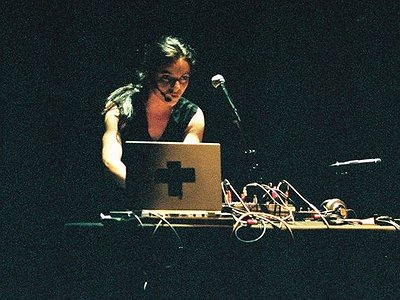Part Two
What do improvisation and composition mean to you and what, to you, are their respective merits?
As I am equally involved with improvisation as with composition, I can’t imagine life without the other. Over the last twenty years of composing it is also clearer and clearer to me how much these two ways of creating music affect each other. One method being mostly “outside time” and the other without the possibility of spending days deciding details or letting new turns have consequences in already made parts; both methods I value highly. In the classical, contemporary music world, I have however, experienced that improvised music is not as looked up to as composed music. And sometimes, but not as often anymore, I meet prejudice against composed music among improvisers.
Do you feel it important that an audience is able to deduct the processes and ideas behind a work purely on the basis of the music? If so, how do you make them transparent?
There is no general answer to that question as each piece carries music in different contexts, sometimes inseparable from stage action or other visual elements, text material, or even a title that can function as an entrance to the work. And sometimes the music is just music. Trying to speak generally, I think it is important to think over what the audience needs to know in order to get something out of the work, and not push on them too much information. Especially when it comes to language, which can quickly overshadow the music’s subtleties.
With more and more musicians creating than ever and more and more of these creations being released, what does this mean for you as an artist in terms of originality? What are some of the areas where you currently see the greatest potential for originality and who are some of the artists and communities that you find inspiring in this regard?
I can’t think of these things when I make music. I am not interested in speculating on originality and career moves, if I was I would rather make commercial music, but that’s not the reason I started to compose. Still, over the years I have found it much more challenging and fruitful to work in the free art field, where the risks are high, but the ideas are not limited by institutional conventions.
How would you define the term “interpretation”? How important is it for you to closely work together with the artists performing your work?
Interpretation is for me connected to communication, which for me is what music is all about. Music is communicated through interpretation, and the performers as well as the listeners are active in the process. Along with that come the circumstances like the room and the situation the music is performed in. The whole context becomes a part of the interpretation.
When I work with other musicians in smaller groups, I work very close with them, often forming a score especially made for those who will premiere the piece. With larger ensembles and less time, I have to standardise more. The opera for babies, Korall Koral, is an example of how I have developed a work for other performers through a long workshop period, using oral and visual instructions as much as scores and libretto parts. Ekkokammer, a recent staged work for Trondheim Voices, is another example of how I have developed a piece without a conventional score, but still thoroughly composed.
The effect of a piece doesn't merely depend on the performance of the musicians, but also on the place it is performed at. How do you see the relationship between location and sound? In how far do you feel the current system of concert halls is still the right one for your music – or for contemporary music in general?
When doing improvised concerts, the room becomes an immensely important collaborator, and by ‘room’, I mean not just the acoustics of the room, but what the room constitutes, is it a room for a certain tradition? The people form the atmosphere of the room, is it welcoming? How careful should I be, or not? An existing piece of music has to be able to adapt to the room and the situation with a purpose. Sometimes the music is alien to the room, but that can also be good, the concert halls can be very good for many things, and other rooms not intended for concerts as well. I have seen so many weird, common and uncommon spaces or non-spaces, and not once have I thought that the music wasn’t in a good room. A concert among birches in the Finnish countryside to synchronised swimming, in another closed factory or in a classical hall with gold and chandeliers – all those rooms have something definite to them that the music can communicate with, I think I like rooms with a statement.
What's your view on the role and function of music as well as the (e.g. political/social/creative) tasks of composers today - and how do you try to meet these goals in your work?
We have reached an era with a general acceptance of “how things are” and how that is the “best for the community”. This is what we hear from our politicians every day, and this is what the marked economy is leaning towards. Humans have an urge to live in balance with truth and reality, and we are able to construct and adjust the premises for that in order to live and feel as good citizens. Our consensus is that we trust in our democracy, and the fact that we (in Norway) live in the “most successful country in the world.” The consensus is further that we are a peace-loving, aid-giving and harmless nation with all good intentions. We cannot live our daily lives with a bad conscience, and our leaders take that burden off our shoulders by trivializing the real problems such as exploitation, eco-crime and headless fossil investments.
It seems to take a lot of effort to speak up against our shared reality, because that would be questioning the fundaments of our society – even for artists, who feel they are disqualified being a part of the system too. There are two ways of political action for artists, one is to use your visibility, your fame or whatever and talk about the elephant in the room, another is to bring up contemporary issues in the work itself. I try to do a bit of both, however, politically aimed-art is perhaps one of the biggest challenges, touching what I have mentioned earlier that a textual message can disturb the subtlety of art. But if well-working, an artistic statement is far better than ordinary politics! Artists, like other people, can be interested in and active in a lot of stuff not being directly connected with their work too. It would actually be a good sign if artists participate more in society apart from being representatives of their art.
Do you have a musical vision that you haven't been able to realise for technical or financial reasons – or an idea of what music itself could be beyond its current form?
That is not something I can manage to put into words. I have plenty of visions, but they seem to adjust to what I can manage to get through in the real world, but if you say so, there are actually no limits. How about a concert on Mars?
Find Maja online at ratkje.no






